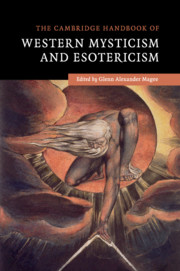Book contents
- Frontmatter
- Dedication
- Contents
- Acknowledgments
- Editor's Introduction
- List of contributors
- I ANTIQUITY
- 1 Ancient Mysteries
- 2 Pythagoras and Pythagoreanism
- 3 Parmenides and Empedocles
- 4 Plato, Plotinus, and Neoplatonism
- 5 Hermetism and Gnosticism
- 6 Early Jewish Mysticism
- 7 Early Christian Mysticism
- II THE MIDDLE AGES
- III THE RENAISSANCE AND EARLY MODERNITY
- IV THE NINETEENTH CENTURY AND BEYOND
- V COMMON THREADS
- Suggestions for Further Reading
- Index
- References
4 - Plato, Plotinus, and Neoplatonism
from I - ANTIQUITY
Published online by Cambridge University Press: 05 May 2016
- Frontmatter
- Dedication
- Contents
- Acknowledgments
- Editor's Introduction
- List of contributors
- I ANTIQUITY
- 1 Ancient Mysteries
- 2 Pythagoras and Pythagoreanism
- 3 Parmenides and Empedocles
- 4 Plato, Plotinus, and Neoplatonism
- 5 Hermetism and Gnosticism
- 6 Early Jewish Mysticism
- 7 Early Christian Mysticism
- II THE MIDDLE AGES
- III THE RENAISSANCE AND EARLY MODERNITY
- IV THE NINETEENTH CENTURY AND BEYOND
- V COMMON THREADS
- Suggestions for Further Reading
- Index
- References
Summary
Introduction
Kant distinguishes between two philosophical schools: one in which knowledge is the fruit of rational labor and the other in which it is rather a kind of ecstasy, the mysterious “apotheosis” of intuition. It is in Plato that he finds the origin of the latter – referring to him as a “Mytagogue,” the founder of a sect, addressing himself only to initiates. The truth is that the “Greek light” is not the same as Kant's “Enlightenment”: It is not a brightness gradually winning the battle against darkness, but rather a flash, a sudden and powerful illumination. This model certainly governs the Platonic tradition. It is for this reason that the question is not whether one can speak of mysticism and esotericism in relation to Platonism, but rather of how to do so.
It is well known that “mysticism” comes from the Greek term mysteria, which refers to the mystery cults, mystes meaning “initiate.” But this linguistic fact leaves room for different inflections, depending on which aspect of the mysteric experience (i.e., the experience linked to mystery cults) is emphasized: the initiation, the revelation, the union with the divine, or the secret. These various inflections are precisely what we try to highlight. Thus, when Plato uses the “mysteric model,” it is mainly as a model of the initiation, that is, of the break with ordinary ways of life and thought that philosophy both provokes and requires. We may, then, wonder whether Plato's philosophy is actually influenced by the mystery cults, and by the figures and trends of thought related to them (especially Orphism and Pythagoreanism). And we also have to ask whether Platonic philosophy is itself homologous to this tradition, insofar as it might be based on an esoteric teaching.
From Plato to Plotinus, the inflection changes: What prevails in the model of Neoplatonism is not so much the initiatic scheme, as the union with the divine. Indeed, Plotinus's philosophy proceeds from a founding experience – the union with the One-Good – and develops as an inquiry into the conditions of its occurrence and recurrence. It is in this manner that the philosophy of Plotinus inherits the mysteric tradition and also has a decisive influence on what is commonly called the “mystical tradition,” particularly the Christian one.
- Type
- Chapter
- Information
- Publisher: Cambridge University PressPrint publication year: 2016



